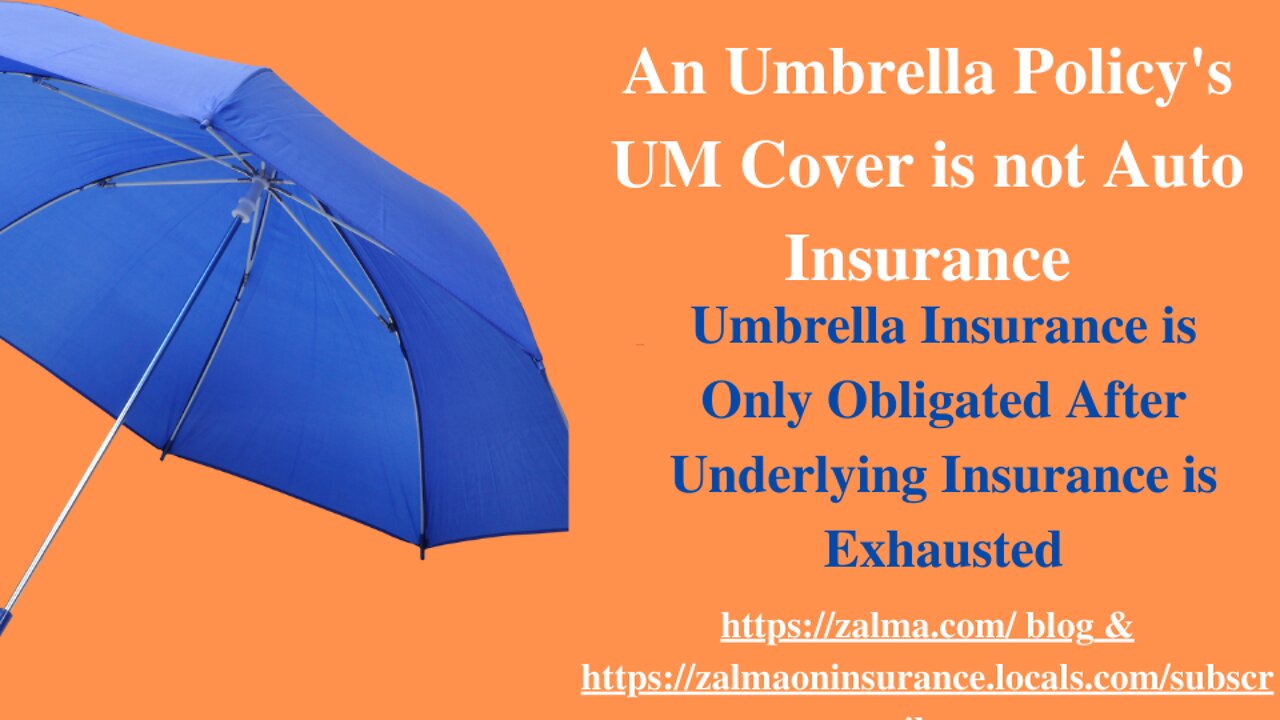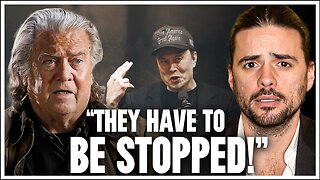Premium Only Content

An Umbrella Policy's UM Cover is not Auto Insurance
Umbrella Insurance is Only Obligated After Underlying Insurance is Exhausted
Anthony DeSmet appealed from the summary judgment granted to Scottsdale Insurance Company on his claim alleging that Scottsdale had acted in bad faith in refusing to fulfill its responsibilities under the excess uninsured-motorist coverage in its umbrella policy.
In Anthony Clarence Desmet v. Scottsdale Insurance Company, No. 21-6143, (D.C. No. 5:20-CV-00330-J) (W.D. Okla.), United States Court of Appeals, Tenth Circuit (June 24, 2022) the Tenth Circuit was called Upon to Determine if an Umbrella Policy that provided excess uninsured motorist coverage was auto insurance.
Scottsdale, in its motion for summary judgment, invoked a provision in its policy that excused it from liability until DeSmet exhausted his uninsured-motorist coverage under his primary motor-vehicle liability policies. The USDC for the Western District of Oklahoma held that the exhaustion provision in Scottsdale's policy was valid and enforceable and that even if it was not, Scottsdale's reliance on the provision was not in bad faith.
BACKGROUND
On March 5, 2018, DeSmet suffered severe bodily injuries when his vehicle was rear-ended by a vehicle driven by William Akehurst. Akehurst's only automobile-liability coverage was a policy issued by State Farm Mutual Automobile Insurance Company, which promptly paid its $50,000 policy limit. This was insufficient to fully cover DeSmet's damages.
If the liability limits of a motor vehicle are less than the amount of the injured insured's claim, that vehicle is classified as uninsured. Such tortfeasor drivers are commonly referred to as underinsured motorists.
At the time of the accident, DeSmet had three separate motor-vehicle liability policies covering several motor vehicles. Each policy provided $500,000 in uninsured/underinsured motorist coverage.
In addition, DeSmet had an umbrella policy with Scottsdale. An umbrella policy is a type of "excess insurance policy." Excess coverage is provided when, under the terms of the policy, the insurer is liable for a loss only after any primary coverage-other insurance-has been exhausted. The Scottsdale policy provided $2 million in excess liability coverage to supplement coverage provided in DeSmet's automobile-liability and home-owner's policies. An endorsement in the policy stated:
It is expressly agreed that liability shall attach to [Scottsdale] only after the insurers of the "underlying insurance" have paid or have been held liable to pay (whether collectible or not) the full amount of their respective uninsured motorists and/or underinsured motorists liability[.]
The term underlying insurance referred to existing motor vehicle liability policies carried by DeSmet that were listed in the Scottsdale policy's Declarations.
Unhappy with the handling of his claim by one of his motor-vehicle liability insurers, DeSmet requested that Scottsdale "step down" and pay the claim itself. Scottsdale responded that per the terms of the policy, Scottsdale would pay only after the underlying insurance limits were exhausted.
DeSmet filed a petition in Oklahoma state court on March 3, 2020, alleging that Scottsdale's conduct surrounding its refusal to pay amounted to a breach of its implied duty of good faith and fair dealing. The suit DeSmet filed included the following statement:
At the time he sued DeSmet had received no payment on the uninsured/underinsured-motorist provisions of any of its three automobile-liability policies.
DISCUSSION
To show bad faith it is not enough that an insurer resists or litigates a claim. There must be a clear showing that the insurer was acting unreasonably and in bad faith by withholding payment. Thus, DeSmet would need to show that Scottsdale had clearly violated its responsibilities under the umbrella policy; this is a standard he could not meet.
Unfortunately for DeSmet, § 3636 does not apply to the Scottsdale umbrella policy. The Oklahoma Supreme Court has repeatedly said that umbrella policies are not "motor vehicle liability policies" of the type governed by § 3636. The leading case is Moser v. Liberty Mutual Insurance Co., 731 P.2d 406 (Okla. 1986). The court responded that "[t]he uninsured motorist provisions [of § 3636] apply [only] to . . . automobile liability insurance policies . . . but not to 'umbrella' policies ...." Id. at 409 (emphasis added).
ZALMA OPINION
I can understand Mr. DeSmet's impatience with his auto insurer's delay in paying his claim but that does allow him to sue his Umbrella insurer asking that it ignore the clear and unambiguous conditions of its policy rather than suing the auto insurers who have failed to pay his claim. Rather than act reasonably he sued Scottsdale and failed to sue those insurers who owed him and who had failed to pay. His actions were illogical and in light of Oklahoma Supreme Court precedent he wasted the court's time.
(c) 2022 Barry Zalma & ClaimSchool, Inc.
-
 13:02
13:02
Barry Zalma, Inc. on Insurance Law
1 year agoMurder Pays
3581 -
 5:49
5:49
Hannah Barron
23 hours agoRedneck Euro Mount
12.8K19 -
 32:34
32:34
hickok45
8 hours agoSunday Shoot-a-Round # 268
8.81K8 -
 27:33
27:33
The Finance Hub
17 hours ago $6.33 earnedBREAKING: ALINA HABBA JUST DROPPED A MASSIVE BOMBSHELL!!!
28.6K59 -
 40:23
40:23
PMG
22 hours ago $0.62 earnedHannah Faulkner and Dr. Michael Schwartz | EXPOSING BIG PHARMA
16.2K1 -
 18:55
18:55
GBGunsRumble
20 hours agoGBGuns Range Report & Channel Update 15FEB25
11.5K -
 13:31:32
13:31:32
iViperKing
20 hours agoGood Times + Good Energy Ft. Whez.. #VKGFAM #RRR
99.2K13 -
 12:24
12:24
Winston Marshall
1 day agoWOAH! Bannon just Revealed THIS About MUSK - The Tech-Right vs MAGA Right Civil War Ramps Up
225K310 -
 7:33:46
7:33:46
Phyxicx
19 hours agoRaid & Rant with the FF14 Guild on Rumble! Halo Night just wrapped up! - Go Follow all these great guys please! - 2/15/2025
151K4 -
 10:42:19
10:42:19
Reolock
21 hours agoWoW Classic Hardcore (LVL 60) | RAID DAY | Rumble FIRST HC Raid
97.3K5